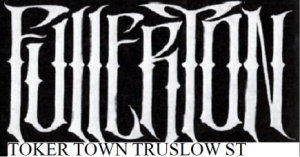Describing the job opportunities for Mexican immigrants in the 20s and 30s in Fullerton, Jennie Reyes, who later owned La Perla restaurant on Truslow Ave, said, "As far as jobs, there were no jobs for the Mexican people, not even as a clerk in the store, not even that. All we would do was work in packinghouses, pick tomatoes in the fields, pick walnuts, pick prunes, pick cucumbers, strawberies and blackberries...we knew we were not wanted in other jobs so we just segregated ourselves to what we could do, where they could accept us." (CSUF Oral History Project)
Decades of job exclusion bred anger and, at times, gangs, like the pachucos and zoot suiters in the 40s, and the more modern gangs we have today, like Fullerton Tokers Town. Reyes said in 1975, "We still have that in our minds about being left out or not being accepted...I think that's why there are so many things happening now because they don't find jobs. They get desperate and they go into gangs, which is not right either...To them everything just closes up in their minds, I guess, and they just rebel against society."
Dicussion of gangs usually depicts these people as anarchist thugs. And sometimes they are. But a factor that often gets left out of discussions is the root cause of most gangs, which was job exclusion and discrimination. It's like punks. Punks didn't just spring up out of a vacuum. Punks in America sprung up as a revolt against Reagan-era politics and culture.
One of the problems with gangs, however, is that once they are born, they tend to take on a life of their own, which can get pretty ugly. In a 2008 article from the OC Register called "He's Lived The Life," former FTT member Michael Maciel gives his reason for joining the gang: "Gangs were a way of gaining a reputation, like a rite of passage in our neighborhood."
I remember, when my brother was going to Fullerton Union High School, a boy named Angel was shot and killed in a gang-related drive-by. Gangs are certainly not good, but I think any meaningful conversation about them has to include historic discrimination and job exclusion. Reflecting on discrimination and gangs in her neighborhood, Reyes said, "Now I can see that it is lack of education."

